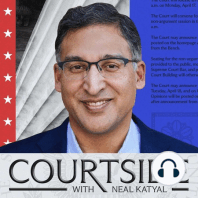3 min listen
Courtside Episode 2 with John Legend
ratings:
Length:
43 minutes
Released:
Jun 28, 2023
Format:
Podcast episode
Description
This is a free preview of a paid episode. To hear more, visit nealkatyal.substack.comTen years ago this week, the Court issued one of its most important, and devastating, decisions. In a 5-4 decision, the Supreme Court struck down key aspects of the Voting Rights Act (VRA). This week’s episode gets into the case with the legendary John Legend. It’s a fitting time to do this, since I just found out I won Moore v. Harper in the U.S. Supreme Court in a 6-3 decision, a case that made clear that many election shenanigans are subject to serious court scrutiny. And the episode begins with a discussion of the Hunter Biden indictment and some reflections on the end of the Supreme Court Term and what to expect. There’s a ton of bonus material for paid subscribers too, including John Legend’s reflections on his childhood dreams and how he made the transition from a consultant at Boston Consulting Group to the mega star he is today. Please consider subscribing, and I'm giving all profits to charity.Shelby County begins back in the 1960s, at the height of the Civil Rights Movement. During this time, the country was deeply divided, and Jim Crow laws were rampant throughout the South. In states such as Texas, Alabama, Georgia, Mississippi, and others, African Americans were systematically denied their right to vote. States and counties weaponized a whole arsenal of different voter suppression tactics. Some were overt, like poll taxes to literacy tests. And others were really subtle, like changing the polling hours for an election in a minority neighborhood the day before the election took place. Or moving the polling place across the street without telling anyone.In response, President Lyndon B. Johnson pushed Congress to pass the Voting Rights Act, which was the single most important piece of voting rights legislation in American history. The Act contained many provisions, but perhaps the two most powerful were Sections 4b and 5. Taken together, these two provisions said that states and localities with a history of racial discrimination in voting practices must get federal court or federal DOJ approval before changing their voting laws. That meant any change – whether trying to have a literacy test or moving a poll across the street. Because Congress knew that there was no limit to the terrible ingenuity of racists who wanted to block people from voting.Now this didn’t impact the whole country. Section 4b, it limited the preclearance requirements only to those states and counties which, prior to the 1964 presidential election, had a voting test in place and less than 50 percent voter registration. This is known as the “Coverage Formula.” In 1965, the formula covered nine states and a few dozen counties that tended to be the most racially discriminatory.The Voting Rights Act (or VRA, as it’s called) was passed in 1965 and set to expire after five years. So, the Act was reauthorized in 1970. It was reauthorized yet again in 1975, 1982, and, in 2006. Each time the Act was reauthorized, it was challenged in Court. Time and again, however, the Supreme Court upheld the law; the Court pointed to the Fifteenth Amendment of the Constitution, which prohibits racial discrimination in voting and gives Congress “the power to enforce this article by appropriate legislation.”But then President Obama won the Presidency. And I was tasked with representing the federal Government in defending the Voting Rights Act. It was my 4th Supreme Court argument ever. My boss Elena Kagan had a long confirmation process, and so instead of her as Solicitor General arguing it, the task fell to me. I worked my tail off. But it was hard to argue about the persistence of race discrimination 3 months after the nation elected its first black President. In any event, I threw myself in, and gave what I think was a pretty bang-up argument. I knew the Act had the blood of patriots on its pages – that Selma and the bridge were a deep part of its history. And I made much of the
Released:
Jun 28, 2023
Format:
Podcast episode
Titles in the series (97)
Episode 24 (original 2020 series) by COURTSIDE with Neal Katyal
